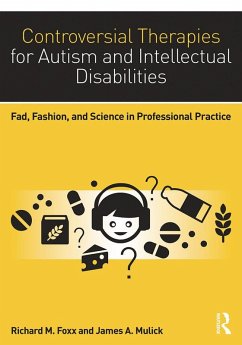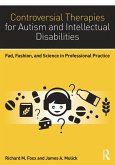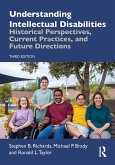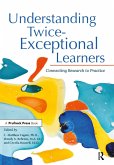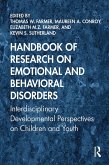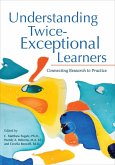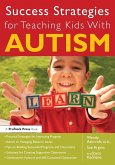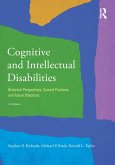Controversial Therapies for Autism and Intellectual Disabilities (eBook, ePUB)
Fad, Fashion, and Science in Professional Practice
Redaktion: Foxx, Richard M.; Mulick, James A.
84,95 €
84,95 €
inkl. MwSt.
Sofort per Download lieferbar

42 °P sammeln
84,95 €
Als Download kaufen

84,95 €
inkl. MwSt.
Sofort per Download lieferbar

42 °P sammeln
Jetzt verschenken
Alle Infos zum eBook verschenken
84,95 €
inkl. MwSt.
Sofort per Download lieferbar
Alle Infos zum eBook verschenken

42 °P sammeln
Controversial Therapies for Autism and Intellectual Disabilities (eBook, ePUB)
Fad, Fashion, and Science in Professional Practice
Redaktion: Foxx, Richard M.; Mulick, James A.
- Format: ePub
- Merkliste
- Auf die Merkliste
- Bewerten Bewerten
- Teilen
- Produkt teilen
- Produkterinnerung
- Produkterinnerung

Bitte loggen Sie sich zunächst in Ihr Kundenkonto ein oder registrieren Sie sich bei
bücher.de, um das eBook-Abo tolino select nutzen zu können.
Hier können Sie sich einloggen
Hier können Sie sich einloggen
Sie sind bereits eingeloggt. Klicken Sie auf 2. tolino select Abo, um fortzufahren.

Bitte loggen Sie sich zunächst in Ihr Kundenkonto ein oder registrieren Sie sich bei bücher.de, um das eBook-Abo tolino select nutzen zu können.
Controversial Therapies for Autism and Intellectual Disabilities, 2nd Edition brings together leading behavioral scientists and practitioners to shed much-needed light on the major controversies surrounding approaches to early intervention, education, treatment, therapy, and remediation for those with autism and other intellectual disabilities.
- Geräte: eReader
- mit Kopierschutz
- eBook Hilfe
- Größe: 5.79MB
Andere Kunden interessierten sich auch für
![Controversial Therapies for Autism and Intellectual Disabilities (eBook, PDF) Controversial Therapies for Autism and Intellectual Disabilities (eBook, PDF)]() Controversial Therapies for Autism and Intellectual Disabilities (eBook, PDF)85,95 €
Controversial Therapies for Autism and Intellectual Disabilities (eBook, PDF)85,95 €![Understanding Intellectual Disabilities (eBook, ePUB) Understanding Intellectual Disabilities (eBook, ePUB)]() Stephen B. RichardsUnderstanding Intellectual Disabilities (eBook, ePUB)76,95 €
Stephen B. RichardsUnderstanding Intellectual Disabilities (eBook, ePUB)76,95 €![Understanding Twice-Exceptional Learners (eBook, ePUB) Understanding Twice-Exceptional Learners (eBook, ePUB)]() C. Matthew FugateUnderstanding Twice-Exceptional Learners (eBook, ePUB)36,95 €
C. Matthew FugateUnderstanding Twice-Exceptional Learners (eBook, ePUB)36,95 €![Handbook of Research on Emotional and Behavioral Disorders (eBook, ePUB) Handbook of Research on Emotional and Behavioral Disorders (eBook, ePUB)]() Handbook of Research on Emotional and Behavioral Disorders (eBook, ePUB)106,95 €
Handbook of Research on Emotional and Behavioral Disorders (eBook, ePUB)106,95 €![Understanding Twice-Exceptional Learners (eBook, ePUB) Understanding Twice-Exceptional Learners (eBook, ePUB)]() C. Matthew FugateUnderstanding Twice-Exceptional Learners (eBook, ePUB)30,95 €
C. Matthew FugateUnderstanding Twice-Exceptional Learners (eBook, ePUB)30,95 €![Success Strategies for Teaching Kids With Autism (eBook, ePUB) Success Strategies for Teaching Kids With Autism (eBook, ePUB)]() Wendy AshcroftSuccess Strategies for Teaching Kids With Autism (eBook, ePUB)20,95 €
Wendy AshcroftSuccess Strategies for Teaching Kids With Autism (eBook, ePUB)20,95 €![Cognitive and Intellectual Disabilities (eBook, ePUB) Cognitive and Intellectual Disabilities (eBook, ePUB)]() Stephen B. RichardsCognitive and Intellectual Disabilities (eBook, ePUB)106,95 €
Stephen B. RichardsCognitive and Intellectual Disabilities (eBook, ePUB)106,95 €-
-
-
Controversial Therapies for Autism and Intellectual Disabilities, 2nd Edition brings together leading behavioral scientists and practitioners to shed much-needed light on the major controversies surrounding approaches to early intervention, education, treatment, therapy, and remediation for those with autism and other intellectual disabilities.
Hinweis: Dieser Artikel kann nur an eine deutsche Lieferadresse ausgeliefert werden.
Dieser Download kann aus rechtlichen Gründen nur mit Rechnungsadresse in A, B, BG, CY, CZ, D, DK, EW, E, FIN, F, GR, HR, H, IRL, I, LT, L, LR, M, NL, PL, P, R, S, SLO, SK ausgeliefert werden.
Hinweis: Dieser Artikel kann nur an eine deutsche Lieferadresse ausgeliefert werden.
Produktdetails
- Produktdetails
- Verlag: Taylor & Francis eBooks
- Seitenzahl: 608
- Erscheinungstermin: 14. Oktober 2015
- Englisch
- ISBN-13: 9781317623823
- Artikelnr.: 43980294
- Verlag: Taylor & Francis eBooks
- Seitenzahl: 608
- Erscheinungstermin: 14. Oktober 2015
- Englisch
- ISBN-13: 9781317623823
- Artikelnr.: 43980294
- Herstellerkennzeichnung Die Herstellerinformationen sind derzeit nicht verfügbar.
Richard M. Foxx, Ph.D., is Professor of Psychology at Penn State University Harrisburg and Clinical Adjunct Professor of Pediatrics in the College of Medicine at Pennsylvania State University in Hershey, Pennsylvania, USA. He was the recipient of the American Psychological Association's Award for Distinguished Professional Contributions to Applied Research in 2013. James A. Mulick, Ph.D., is Professor in the Departments of Pediatrics and Psychology at The Ohio State University and a pediatric psychology expert at Nationwide Children's Hospital in Columbus, Ohio. He received the 2009 John W. Jacobson Award for Critical Thinking from the American Psychological Association Division on Intellectual and Developmental Disabilities.
Preface (First Edition): Fad, Dubious, Controversial, Pseudo-Scientific,
and Politically-Correct Treatments in Autism and Intellectual Disabilities
Services by John W. Jacobson, Richard M. Foxx, and James A. Mulick
Preface: Fad, Dubious, Controversial, Pseudo-Scientific, and
Politically-Correct Treatments in Autism and Developmental Disabilities
Services by Richard M. Foxx and James A. Mulick
Part I: General Issues
Chapter 1: Where Do Fads Come From? by Stuart Vyse
Chapter 2: The Nature and Value of Empirically Validated Interventions by
Crighton Newsom and Christine A. Hovanitz
Chapter 3: The Appeal of Unvalidated Treatments by Tristram Smith
Part II: Historical, Cultural, and Psychological Issues
Chapter 4: History of Fad, Pseudo-Scientific and Dubious Treatments in
Intellectual Disabilities: From the 1800s to Today by John W. Jacobson,
James A. Mulick, Richard M. Foxx and Elizabeth Kryszak
Chapter 5: The Delusion of Full Inclusion by James M. Kauffman, Devery Mock
Ward and Jeanmarie Badar
Chapter 6: Explaining Gullibility of Service Providers Towards Treatment
Fads by Stephen Greenspan
Chapter 7: Developmental Disabilities and the Paranormal by John W.
Jacobson, Elizabeth Kryszak and James A. Mulick
Part III: Field-Specific Issues
Chapter 8: Fads in Special Education by Thomas Zane, Mary Jane Weiss, Sam
Blanco, Lorraine Otte, and Josephine Southwick
Chapter 9: The Neutralization of Special Education, Revisted by Susan M.
Silvestri and William L. Heward
Chapter 10: Fads and Controversial Treatments in Speech-Language Pathology
by Cheryl D. Gunter and Mareile A. Koenig
Part IV: Disorder and Symptom-Specific Issues
Chapter 11: Autism: A Late Twentieth Century Fad Magnet by Bernard Metz,
James A. Mulick, and Eric M. Butter
Chapter 12: Helping Parents Separate the Wheat from the Chaff: Putting
Autism Treatments to the Test by Shannon Kay
Chapter 13: A Map Through the Minefield: A parent's primer to find autism
treatment that works! by Sabrina Freeman
Chapter 14: The Perpetuation of the Myth of the Nonaversive Treatment of
Severe Behavior by Richard M. Foxx
Part V: Intervention Specific Issues
Chapter 15: Sensory Integrative Therapy by Tristram Smith, Daniel W.
Mruzek, and Dennis Mozingo
Chapter 16: Auditory Integration Training: A Critical Review (1991-2014) by
Oliver C. Mudford and Chris Cullen
Chapter 17: Facilitated Communication: The Ultimate Fad Treatment by John
W. Jacobson, Richard M. Foxx, and James A. Mulick
Chapter 18: Positive Behavior Support: A Paternalistic Utopian Delusion by
James A. Mulick and Eric Butter
Chapter 19: Nonaversive Treatment by Crighton Newsom and Kimberly A.
Kroeger
Chapter 20: Gentle Teaching by Angela M. Arnold-Saritepe, Oliver C. Mudford
and Chris Cullen
Chapter 21: Pet Me, Sniff Me, Squeeze Me: Quack Treatment for Autism by
Gerald P. Koocher and Erica Gill
Chapter 22: Relationship-Based Therapies for Autism Spectrum Disorders by
Thomas Zane, Mary Jane Weiss, Kari Dunlop, and Josephine Southwick
Chapter 23: Old Horses in New Stables: Rapid Prompting, Facilitated
Communication, Science, Ethics, and the History of Magic by James T. Todd
Chapter 24: The Gluten-Free, Casein-Free Diet by Keith E. Williams and
Richard M. Foxx
Chapter 25: Why ABA is not a Fad, a Pseudo Science, a Dubious or
Controversial Treatment, or Politically Correct by Richard M. Foxx
Part VI: Ethical, Legal and Political Concerns
Chapter 26: Ethics, Controversial Treatments and Applied Behavior Analysis
by Peter Sturmey
Chapter 27: The National Institute of Health Consensus Development
Conference on the Treatment of Destructive Behaviors: A 25-Year Update of a
Study in Hardball Politics by Richard M. Foxx
Chapter 28: Teaching Ethics in Behavior Analysis: Philosophy, Methods and
Resources by Jon Bailey and Mary Burch
Chapter 29: Evidence-Based Practices In Treatment for Autism and
Intellectual Disabilities by Thomas Zane, Mary Jane Weiss, Cheryl Davis,
and Ian Melton
Chapter 30: State Government Regulation of Behavioral Treatment: The Good,
the Bad, and the Ugly by Richard M. Foxx, Valeria LaCerra, Nina Carraghan,
and Jessica A. Fedezko
Afterword: A Decade Later by J. M. Johnston
List of Contributors
and Politically-Correct Treatments in Autism and Intellectual Disabilities
Services by John W. Jacobson, Richard M. Foxx, and James A. Mulick
Preface: Fad, Dubious, Controversial, Pseudo-Scientific, and
Politically-Correct Treatments in Autism and Developmental Disabilities
Services by Richard M. Foxx and James A. Mulick
Part I: General Issues
Chapter 1: Where Do Fads Come From? by Stuart Vyse
Chapter 2: The Nature and Value of Empirically Validated Interventions by
Crighton Newsom and Christine A. Hovanitz
Chapter 3: The Appeal of Unvalidated Treatments by Tristram Smith
Part II: Historical, Cultural, and Psychological Issues
Chapter 4: History of Fad, Pseudo-Scientific and Dubious Treatments in
Intellectual Disabilities: From the 1800s to Today by John W. Jacobson,
James A. Mulick, Richard M. Foxx and Elizabeth Kryszak
Chapter 5: The Delusion of Full Inclusion by James M. Kauffman, Devery Mock
Ward and Jeanmarie Badar
Chapter 6: Explaining Gullibility of Service Providers Towards Treatment
Fads by Stephen Greenspan
Chapter 7: Developmental Disabilities and the Paranormal by John W.
Jacobson, Elizabeth Kryszak and James A. Mulick
Part III: Field-Specific Issues
Chapter 8: Fads in Special Education by Thomas Zane, Mary Jane Weiss, Sam
Blanco, Lorraine Otte, and Josephine Southwick
Chapter 9: The Neutralization of Special Education, Revisted by Susan M.
Silvestri and William L. Heward
Chapter 10: Fads and Controversial Treatments in Speech-Language Pathology
by Cheryl D. Gunter and Mareile A. Koenig
Part IV: Disorder and Symptom-Specific Issues
Chapter 11: Autism: A Late Twentieth Century Fad Magnet by Bernard Metz,
James A. Mulick, and Eric M. Butter
Chapter 12: Helping Parents Separate the Wheat from the Chaff: Putting
Autism Treatments to the Test by Shannon Kay
Chapter 13: A Map Through the Minefield: A parent's primer to find autism
treatment that works! by Sabrina Freeman
Chapter 14: The Perpetuation of the Myth of the Nonaversive Treatment of
Severe Behavior by Richard M. Foxx
Part V: Intervention Specific Issues
Chapter 15: Sensory Integrative Therapy by Tristram Smith, Daniel W.
Mruzek, and Dennis Mozingo
Chapter 16: Auditory Integration Training: A Critical Review (1991-2014) by
Oliver C. Mudford and Chris Cullen
Chapter 17: Facilitated Communication: The Ultimate Fad Treatment by John
W. Jacobson, Richard M. Foxx, and James A. Mulick
Chapter 18: Positive Behavior Support: A Paternalistic Utopian Delusion by
James A. Mulick and Eric Butter
Chapter 19: Nonaversive Treatment by Crighton Newsom and Kimberly A.
Kroeger
Chapter 20: Gentle Teaching by Angela M. Arnold-Saritepe, Oliver C. Mudford
and Chris Cullen
Chapter 21: Pet Me, Sniff Me, Squeeze Me: Quack Treatment for Autism by
Gerald P. Koocher and Erica Gill
Chapter 22: Relationship-Based Therapies for Autism Spectrum Disorders by
Thomas Zane, Mary Jane Weiss, Kari Dunlop, and Josephine Southwick
Chapter 23: Old Horses in New Stables: Rapid Prompting, Facilitated
Communication, Science, Ethics, and the History of Magic by James T. Todd
Chapter 24: The Gluten-Free, Casein-Free Diet by Keith E. Williams and
Richard M. Foxx
Chapter 25: Why ABA is not a Fad, a Pseudo Science, a Dubious or
Controversial Treatment, or Politically Correct by Richard M. Foxx
Part VI: Ethical, Legal and Political Concerns
Chapter 26: Ethics, Controversial Treatments and Applied Behavior Analysis
by Peter Sturmey
Chapter 27: The National Institute of Health Consensus Development
Conference on the Treatment of Destructive Behaviors: A 25-Year Update of a
Study in Hardball Politics by Richard M. Foxx
Chapter 28: Teaching Ethics in Behavior Analysis: Philosophy, Methods and
Resources by Jon Bailey and Mary Burch
Chapter 29: Evidence-Based Practices In Treatment for Autism and
Intellectual Disabilities by Thomas Zane, Mary Jane Weiss, Cheryl Davis,
and Ian Melton
Chapter 30: State Government Regulation of Behavioral Treatment: The Good,
the Bad, and the Ugly by Richard M. Foxx, Valeria LaCerra, Nina Carraghan,
and Jessica A. Fedezko
Afterword: A Decade Later by J. M. Johnston
List of Contributors
Preface (First Edition): Fad, Dubious, Controversial, Pseudo-Scientific,
and Politically-Correct Treatments in Autism and Intellectual Disabilities
Services by John W. Jacobson, Richard M. Foxx, and James A. Mulick
Preface: Fad, Dubious, Controversial, Pseudo-Scientific, and
Politically-Correct Treatments in Autism and Developmental Disabilities
Services by Richard M. Foxx and James A. Mulick
Part I: General Issues
Chapter 1: Where Do Fads Come From? by Stuart Vyse
Chapter 2: The Nature and Value of Empirically Validated Interventions by
Crighton Newsom and Christine A. Hovanitz
Chapter 3: The Appeal of Unvalidated Treatments by Tristram Smith
Part II: Historical, Cultural, and Psychological Issues
Chapter 4: History of Fad, Pseudo-Scientific and Dubious Treatments in
Intellectual Disabilities: From the 1800s to Today by John W. Jacobson,
James A. Mulick, Richard M. Foxx and Elizabeth Kryszak
Chapter 5: The Delusion of Full Inclusion by James M. Kauffman, Devery Mock
Ward and Jeanmarie Badar
Chapter 6: Explaining Gullibility of Service Providers Towards Treatment
Fads by Stephen Greenspan
Chapter 7: Developmental Disabilities and the Paranormal by John W.
Jacobson, Elizabeth Kryszak and James A. Mulick
Part III: Field-Specific Issues
Chapter 8: Fads in Special Education by Thomas Zane, Mary Jane Weiss, Sam
Blanco, Lorraine Otte, and Josephine Southwick
Chapter 9: The Neutralization of Special Education, Revisted by Susan M.
Silvestri and William L. Heward
Chapter 10: Fads and Controversial Treatments in Speech-Language Pathology
by Cheryl D. Gunter and Mareile A. Koenig
Part IV: Disorder and Symptom-Specific Issues
Chapter 11: Autism: A Late Twentieth Century Fad Magnet by Bernard Metz,
James A. Mulick, and Eric M. Butter
Chapter 12: Helping Parents Separate the Wheat from the Chaff: Putting
Autism Treatments to the Test by Shannon Kay
Chapter 13: A Map Through the Minefield: A parent's primer to find autism
treatment that works! by Sabrina Freeman
Chapter 14: The Perpetuation of the Myth of the Nonaversive Treatment of
Severe Behavior by Richard M. Foxx
Part V: Intervention Specific Issues
Chapter 15: Sensory Integrative Therapy by Tristram Smith, Daniel W.
Mruzek, and Dennis Mozingo
Chapter 16: Auditory Integration Training: A Critical Review (1991-2014) by
Oliver C. Mudford and Chris Cullen
Chapter 17: Facilitated Communication: The Ultimate Fad Treatment by John
W. Jacobson, Richard M. Foxx, and James A. Mulick
Chapter 18: Positive Behavior Support: A Paternalistic Utopian Delusion by
James A. Mulick and Eric Butter
Chapter 19: Nonaversive Treatment by Crighton Newsom and Kimberly A.
Kroeger
Chapter 20: Gentle Teaching by Angela M. Arnold-Saritepe, Oliver C. Mudford
and Chris Cullen
Chapter 21: Pet Me, Sniff Me, Squeeze Me: Quack Treatment for Autism by
Gerald P. Koocher and Erica Gill
Chapter 22: Relationship-Based Therapies for Autism Spectrum Disorders by
Thomas Zane, Mary Jane Weiss, Kari Dunlop, and Josephine Southwick
Chapter 23: Old Horses in New Stables: Rapid Prompting, Facilitated
Communication, Science, Ethics, and the History of Magic by James T. Todd
Chapter 24: The Gluten-Free, Casein-Free Diet by Keith E. Williams and
Richard M. Foxx
Chapter 25: Why ABA is not a Fad, a Pseudo Science, a Dubious or
Controversial Treatment, or Politically Correct by Richard M. Foxx
Part VI: Ethical, Legal and Political Concerns
Chapter 26: Ethics, Controversial Treatments and Applied Behavior Analysis
by Peter Sturmey
Chapter 27: The National Institute of Health Consensus Development
Conference on the Treatment of Destructive Behaviors: A 25-Year Update of a
Study in Hardball Politics by Richard M. Foxx
Chapter 28: Teaching Ethics in Behavior Analysis: Philosophy, Methods and
Resources by Jon Bailey and Mary Burch
Chapter 29: Evidence-Based Practices In Treatment for Autism and
Intellectual Disabilities by Thomas Zane, Mary Jane Weiss, Cheryl Davis,
and Ian Melton
Chapter 30: State Government Regulation of Behavioral Treatment: The Good,
the Bad, and the Ugly by Richard M. Foxx, Valeria LaCerra, Nina Carraghan,
and Jessica A. Fedezko
Afterword: A Decade Later by J. M. Johnston
List of Contributors
and Politically-Correct Treatments in Autism and Intellectual Disabilities
Services by John W. Jacobson, Richard M. Foxx, and James A. Mulick
Preface: Fad, Dubious, Controversial, Pseudo-Scientific, and
Politically-Correct Treatments in Autism and Developmental Disabilities
Services by Richard M. Foxx and James A. Mulick
Part I: General Issues
Chapter 1: Where Do Fads Come From? by Stuart Vyse
Chapter 2: The Nature and Value of Empirically Validated Interventions by
Crighton Newsom and Christine A. Hovanitz
Chapter 3: The Appeal of Unvalidated Treatments by Tristram Smith
Part II: Historical, Cultural, and Psychological Issues
Chapter 4: History of Fad, Pseudo-Scientific and Dubious Treatments in
Intellectual Disabilities: From the 1800s to Today by John W. Jacobson,
James A. Mulick, Richard M. Foxx and Elizabeth Kryszak
Chapter 5: The Delusion of Full Inclusion by James M. Kauffman, Devery Mock
Ward and Jeanmarie Badar
Chapter 6: Explaining Gullibility of Service Providers Towards Treatment
Fads by Stephen Greenspan
Chapter 7: Developmental Disabilities and the Paranormal by John W.
Jacobson, Elizabeth Kryszak and James A. Mulick
Part III: Field-Specific Issues
Chapter 8: Fads in Special Education by Thomas Zane, Mary Jane Weiss, Sam
Blanco, Lorraine Otte, and Josephine Southwick
Chapter 9: The Neutralization of Special Education, Revisted by Susan M.
Silvestri and William L. Heward
Chapter 10: Fads and Controversial Treatments in Speech-Language Pathology
by Cheryl D. Gunter and Mareile A. Koenig
Part IV: Disorder and Symptom-Specific Issues
Chapter 11: Autism: A Late Twentieth Century Fad Magnet by Bernard Metz,
James A. Mulick, and Eric M. Butter
Chapter 12: Helping Parents Separate the Wheat from the Chaff: Putting
Autism Treatments to the Test by Shannon Kay
Chapter 13: A Map Through the Minefield: A parent's primer to find autism
treatment that works! by Sabrina Freeman
Chapter 14: The Perpetuation of the Myth of the Nonaversive Treatment of
Severe Behavior by Richard M. Foxx
Part V: Intervention Specific Issues
Chapter 15: Sensory Integrative Therapy by Tristram Smith, Daniel W.
Mruzek, and Dennis Mozingo
Chapter 16: Auditory Integration Training: A Critical Review (1991-2014) by
Oliver C. Mudford and Chris Cullen
Chapter 17: Facilitated Communication: The Ultimate Fad Treatment by John
W. Jacobson, Richard M. Foxx, and James A. Mulick
Chapter 18: Positive Behavior Support: A Paternalistic Utopian Delusion by
James A. Mulick and Eric Butter
Chapter 19: Nonaversive Treatment by Crighton Newsom and Kimberly A.
Kroeger
Chapter 20: Gentle Teaching by Angela M. Arnold-Saritepe, Oliver C. Mudford
and Chris Cullen
Chapter 21: Pet Me, Sniff Me, Squeeze Me: Quack Treatment for Autism by
Gerald P. Koocher and Erica Gill
Chapter 22: Relationship-Based Therapies for Autism Spectrum Disorders by
Thomas Zane, Mary Jane Weiss, Kari Dunlop, and Josephine Southwick
Chapter 23: Old Horses in New Stables: Rapid Prompting, Facilitated
Communication, Science, Ethics, and the History of Magic by James T. Todd
Chapter 24: The Gluten-Free, Casein-Free Diet by Keith E. Williams and
Richard M. Foxx
Chapter 25: Why ABA is not a Fad, a Pseudo Science, a Dubious or
Controversial Treatment, or Politically Correct by Richard M. Foxx
Part VI: Ethical, Legal and Political Concerns
Chapter 26: Ethics, Controversial Treatments and Applied Behavior Analysis
by Peter Sturmey
Chapter 27: The National Institute of Health Consensus Development
Conference on the Treatment of Destructive Behaviors: A 25-Year Update of a
Study in Hardball Politics by Richard M. Foxx
Chapter 28: Teaching Ethics in Behavior Analysis: Philosophy, Methods and
Resources by Jon Bailey and Mary Burch
Chapter 29: Evidence-Based Practices In Treatment for Autism and
Intellectual Disabilities by Thomas Zane, Mary Jane Weiss, Cheryl Davis,
and Ian Melton
Chapter 30: State Government Regulation of Behavioral Treatment: The Good,
the Bad, and the Ugly by Richard M. Foxx, Valeria LaCerra, Nina Carraghan,
and Jessica A. Fedezko
Afterword: A Decade Later by J. M. Johnston
List of Contributors
